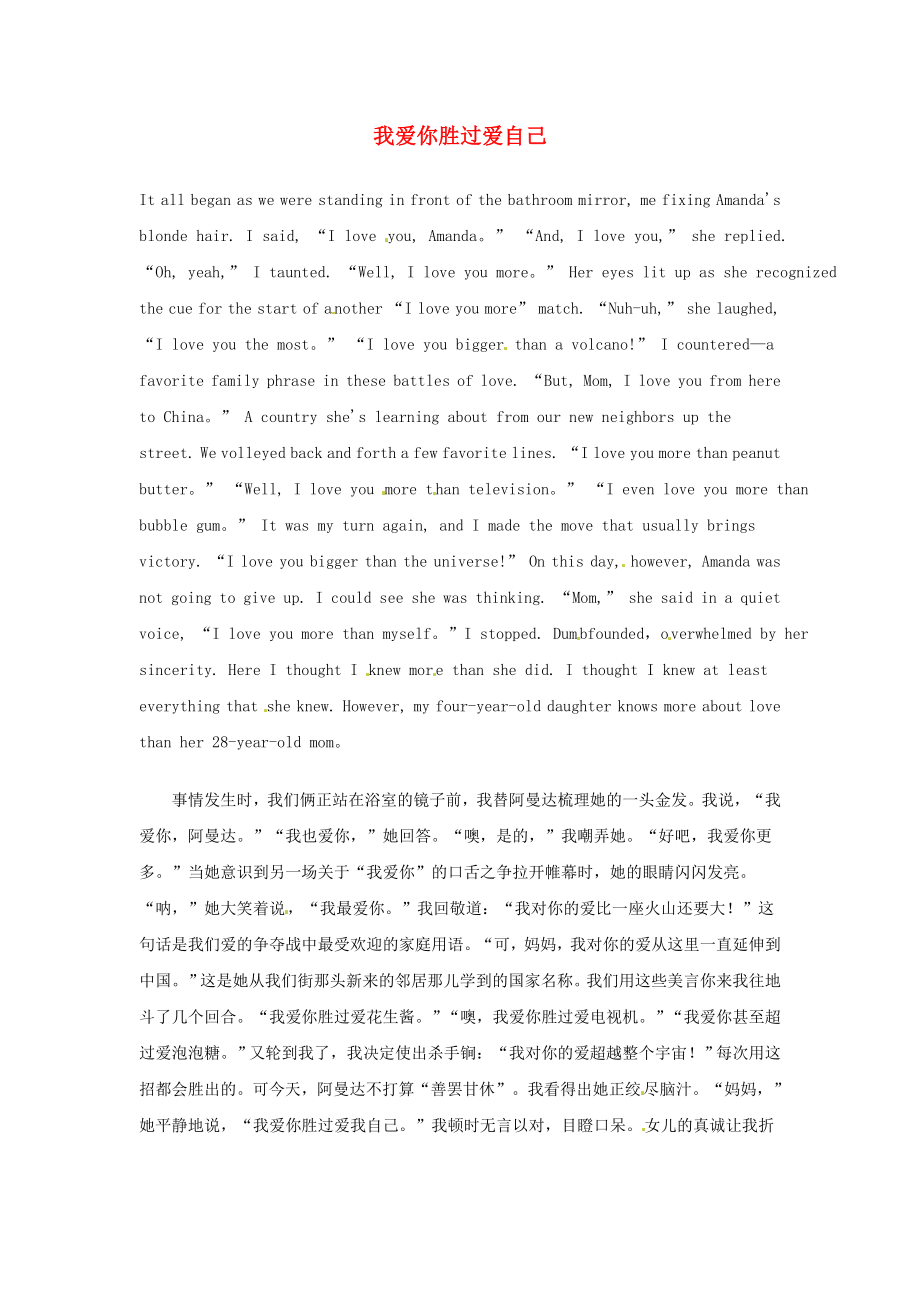《高中英語(yǔ) 雙語(yǔ)美文閱讀 我愛(ài)你勝過(guò)愛(ài)自己素材》由會(huì)員分享��,可在線閱讀���,更多相關(guān)《高中英語(yǔ) 雙語(yǔ)美文閱讀 我愛(ài)你勝過(guò)愛(ài)自己素材(2頁(yè)珍藏版)》請(qǐng)?jiān)谘b配圖網(wǎng)上搜索���。
1、我愛(ài)你勝過(guò)愛(ài)自己
It all began as we were standing in front of the bathroom mirror, me fixing Amanda's blonde hair. I said, “I love you, Amanda�����?����!?“And, I love you,” she replied. “Oh, yeah,” I taunted. “Well, I love you more?��!?Her eyes lit up as she recognized the cue for the start of another “I love you mor
2���、e” match. “Nuh-uh,” she laughed, “I love you the most?!?“I love you bigger than a volcano!” I countered—a favorite family phrase in these battles of love. “But, Mom, I love you from here to China?���!?A country she's learning about from our new neighbors up the street. We volleyed back and forth a few
3��、favorite lines. “I love you more than peanut butter�。” “Well, I love you more than television�。” “I even love you more than bubble gum�。” It was my turn again, and I made the move that usually brings victory. “I love you bigger than the universe!” On this day, however, Amanda was not going to give up.
4�、I could see she was thinking. “Mom,” she said in a quiet voice, “I love you more than myself?��!盜 stopped. Dumbfounded�,overwhelmed by her sincerity. Here I thought I knew more than she did. I thought I knew at least everything that she knew. However, my four-year-old daughter knows more about love tha
5、n her 28-year-old mom��。
事情發(fā)生時(shí)�,我們倆正站在浴室的鏡子前,我替阿曼達(dá)梳理她的一頭金發(fā)����。我說(shuō),“我愛(ài)你���,阿曼達(dá)����?��!薄拔乙矏?ài)你��,”她回答�����?���!班蓿堑?,”我嘲弄她?����!昂冒?,我愛(ài)你更多?!碑?dāng)她意識(shí)到另一場(chǎng)關(guān)于“我愛(ài)你”的口舌之爭(zhēng)拉開(kāi)帷幕時(shí),她的眼睛閃閃發(fā)亮�。“吶�,”她大笑著說(shuō)�,“我最愛(ài)你?��!蔽一鼐吹溃骸拔覍?duì)你的愛(ài)比一座火山還要大�!”這句話是我們愛(ài)的爭(zhēng)奪戰(zhàn)中最受歡迎的家庭用語(yǔ)����?!翱?����,媽媽���,我對(duì)你的愛(ài)從這里一直延伸到中國(guó)�����?����!边@是她從我們街那頭新來(lái)的鄰居那兒學(xué)到的國(guó)家名稱�����。我們用這些美言你來(lái)我往地斗了幾個(gè)回合����?��!拔覑?ài)你勝過(guò)愛(ài)花生醬���?����!薄班?����,我愛(ài)你勝過(guò)愛(ài)電視機(jī)��?��!薄拔覑?ài)你甚至超過(guò)愛(ài)泡泡糖?��!庇州喌轿伊?���,我決定使出殺手锏:“我對(duì)你的愛(ài)超越整個(gè)宇宙�����!”每次用這招都會(huì)勝出的��?��?山裉?���,阿曼達(dá)不打算“善罷甘休”����。我看得出她正絞盡腦汁?�!皨寢?��,”她平靜地說(shuō)�����,“我愛(ài)你勝過(guò)愛(ài)我自己�?��!蔽翌D時(shí)無(wú)言以對(duì)�,目瞪口呆。女兒的真誠(chéng)讓我折服�����。我原以為�����,我比她懂得更多�����。我以為����,至少她知道的事情我都知道??墒牵夷?歲的寶貝女兒比她28歲的媽媽更懂得愛(ài)�。
 高中英語(yǔ) 雙語(yǔ)美文閱讀 我愛(ài)你勝過(guò)愛(ài)自己素材
高中英語(yǔ) 雙語(yǔ)美文閱讀 我愛(ài)你勝過(guò)愛(ài)自己素材

